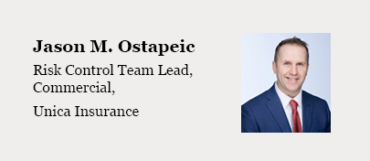Fleet operations in the construction industry face mounting challenges — from driver shortages and seasonal employment, to the increasing complexity of fleet safety. These dynamics pose significant exposures if they’re not proactively managed, says Jason Ostapeic, Unica Insurance’s Senior Commercial Risk Control Consultant.
“Many smaller construction businesses don’t have dedicated fleet managers or the resources to formally oversee fleet safety,” he says. “If your client has even one regulated vehicle on the road, they should have a fleet safety program in place. It’s not just best practice — it’s essential.”
Why Fleet Safety Matters
Poorly maintained vehicles and underutilized technologies like telematics often lead to inefficiencies. High-risk work environments, evolving sustainability and regulatory expectations, and rising operational costs add further complexity. These factors are often compounded by a lack of driver training, insufficient monitoring, and a lack of comprehensive fleet data, making it difficult for operators to optimize performance and mitigate risks.
By understanding these challenges, brokers can leverage expert guidance to help their construction clients implement fleet risk analysis, develop a robust safety program, and adopt proactive risk management strategies to mitigate risks and improve efficiency in their fleet operations — big or small.
“A well-structured fleet safety program can help reduce accidents, lower repair costs, and help clients save on insurance premiums,” says Ostapeic. “It also protects their reputation and ensures safer roads for employees and the public. Fleet safety isn’t just about compliance; it’s about building a culture of accountability and proactive risk management.”
Ostapeic recalls one organization that did have a cell phone policy, but it was informal and narrowly focused on personal phone use. “One of the company’s drivers was involved in an accident that led to multiple third-party injuries. While the driver was found liable for distracted driving, the company was also held accountable for a settlement because they had no formal, documented driver safety policy in place.”
Building a Strong Fleet Safety Program
The foundation of any fleet safety program is leadership buy-in and clear documentation. Ostapeic emphasizes that these programs must be living documents, continuously updated to reflect new risks and advancements in technology.
“Technology like telematics has become a game changer,” he says. “It allows businesses to track driving behaviours — such as speeding, hard braking, and distracted driving — and provides the insights needed to offer targeted coaching sessions, reduce risky driving behaviours, and ultimately lower repair and insurance costs. But this information is only valuable if it’s reviewed regularly and tied back to a broader safety strategy.”
Key components of a successful fleet safety program include driver selection and monitoring, ongoing driver training, accident reporting and analysis, preventative vehicle maintenance, and incentives for drivers who maintain clean records and demonstrate responsible behaviour.
“Understanding the intricacies of fleet safety and risk management is about more than ticking boxes,” says Ostapeic. “It’s about providing value by protecting your clients’ operations, their employees, and the communities they serve. That’s where Unica can help.”
Leveraging Expert Risk Control and Tailored Solutions
By partnering with Unica Insurance, brokers gain access to expert risk control services and tailored coverage backed by best-in-class claims service — all designed to keep their construction clients moving forward safely.
For construction clients, Unica’s Contractors Connection® offers comprehensive protection tailored for various contractor markets, with coverage for employees, building materials, and equipment.
“At Unica, we go beyond underwriting,” says Ostapeic. “We work directly with brokers to provide hands-on fleet risk assessments and actionable strategies. For smaller clients juggling multiple responsibilities, this support can make all the difference.”
Unica’s dedication to claims excellence is why 98 percent of its insureds are satisfied with their claims experience — yet another reason to trust your best construction clients to Unica. “When claims happen, we prioritize fast response times and transparent communication, ensuring minimal disruption for businesses,” says Ostapeic. He adds that over 97 percent of new claims receive contact within the first two hours.
What to Tell Your Clients
To help brokers guide their construction clients, Unica recommends these actionable steps to mitigate fleet risk:
- Hire qualified drivers: Establish a robust driver selection process that includes verifying valid licences, reviewing driver abstracts, and conducting written and road tests.
- Provide comprehensive training: Develop onboarding and ongoing training programs focused on defensive driving and high-risk behaviour identification. Include training on safe equipment handling and policies addressing distracted driving and drug and alcohol use.
- Implement driver monitoring and feedback: Leverage technology to monitor driving behaviours, optimize route planning, and minimize distracted driving with apps that restrict cell phone use while vehicles are in operation. Telematics and driver abstract reviews can help identify high-risk behaviours like speeding or harsh braking. Regular feedback and coaching sessions based on these insights are key. Following any incidents, conduct post-incident reviews with the driver, HR, and fleet managers to prevent future occurrences.
- Establish clear accident reporting procedures: Create a step-by-step process for reporting accidents, ensuring vehicles are equipped with the necessary forms and instructions. This should include contacting a manager, coordinating with towing services if necessary, and notifying the broker to expedite the claims process.
- Develop maintenance plans and supportive policies: Establish written policies covering pre-trip inspections, load security, and safe parking practices. Implement preventative maintenance programs to ensure vehicles are road-ready and minimize downtime. Additionally, ensure policies are updated regularly to reflect emerging trends and new technologies, continuously enhancing fleet safety.
- Foster a culture of accountability: Encourage drivers to take fleet safety seriously through clear policies and incentives.
By sharing these actionable steps, brokers can position themselves as invaluable partners in their client’s risk management strategies—enhancing operational efficiencies, reducing losses, and fostering a stronger culture of safety in commercial industries and on our roads.
Discover how Unica Insurance can help you protect your best clients with tailored commercial coverage backed by claims and risk expertise.
Ready to fuel your growth? Contact our Business Development Team to learn how you can join Unica’s exclusive network of Broker Partners.










